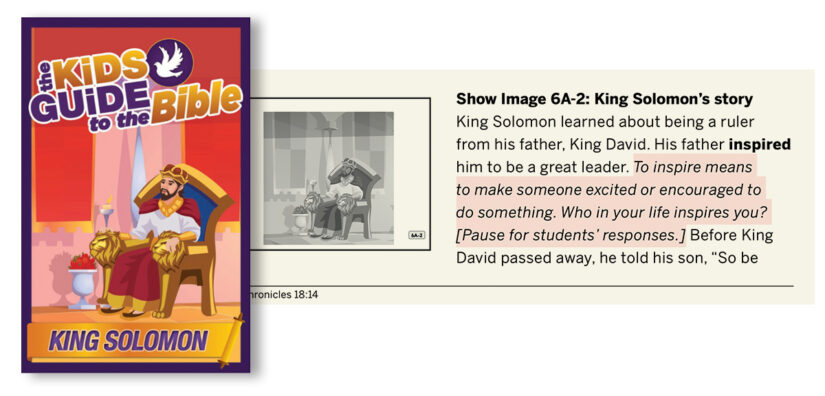Mike Huckabee’s ‘Faith-Based’ Media Company Contributed to New Texas Curriculum
The link to the former Arkansas governor and Trump appointee for ambassador to Israel comes as the state votes on the Bible-infused program.
By Linda Jacobson | November 18, 2024The Texas Education Agency hired a conservative educational publishing company co-founded by former Arkansas Gov. Mike Huckabee to provide biblical content for the state’s proposed K-5 reading program — a curriculum that has come under criticism for its emphasis on evangelical Christianity.
Espired, a partnership with Florida investor Brad Saft, sells right-leaning books and videos, from Fighting Indoctrination and The Truth about Climate Change to an updated guide on this year’s election, including the assassination attempt against President-elect Donald Trump. Last week, Trump tapped Huckabee, a Southern Baptist minister who hosts a talk show on a Christian network, to serve as ambassador to Israel.

But the company also sells The Kids Guide to the Bible, with animated Old and New Testament stories, like Noah’s ark and the Resurrection. The series features colorful illustrations drawn in the identical style as those in the Texas curriculum. A kindergarten lesson’s image of King Solomon, for example, and two more on the Golden Rule are lifted wholesale from covers of the company’s books.

Saft, a Princeton graduate and history buff, did not answer emails or messages on social media. Chad Gallagher, an eSpired spokesman and former Huckabee adviser, declined to provide more details on how the company contributed to the program, but called eSpired the “leading provider of curriculum to states searching for unbiased history” and “lessons that explain the literary and historical value of the Bible.”
Saft and Inspired by Education LLC, an alternate name for the company, were on a list of subcontractors for the curriculum that the Texas Education Agency shared with The 74 in May. Contacted earlier this month, officials did not respond to questions about how much the state paid eSpired or the degree of influence the company had over the lessons.
The connection to Huckabee’s business venture, also known as EverBright Media, comes as the State Board of Education is set to vote Monday on whether to add the program, called Bluebonnet Learning, to a list of approved reading programs. The state is heavily promoting the program at a time when some districts are operating in the red. The board’s blessing means districts would be eligible for extra funding — up to $60 per student — if they adopt the program.
“Districts’ hands are tied because they are in desperate need of additional funding, yet the state of Texas is trying to force them to use this curriculum as the only way to get additional funding,” said Clinton Gill, a specialist with the Texas State Teachers Association and a former teacher in Lubbock, one of the districts that piloted an early version of the program. The state, he said, should involve teachers in developing the curriculum, “not some company with a political agenda.”
The curriculum has won praise from GOP leaders, classical education proponents and influential evangelists who want the Bible to be more prominent in public schools. But the first draft, unveiled in late May, drew sharp criticism from those who said the authors disregarded other religions and introduced topics of faith more appropriate for church and home.
The state has since corrected many factual errors, but the bias toward Christianity remains, according to several experts. Education Commissioner Mike Morath will need eight board members in favor of Bluebonnet for it to be added to the list, but the vote is expected to be tight.
“This is the one of the hardest votes I’ve ever had to make in 22 years on the State Board of Education. I have lost sleep over it,” said Republican Pat Hardy, who was defeated in this year’s election. This week’s series of meetings are her last on the board. “I’ve literally heard from hundreds of people on both sides.”
Last week, Texas Values, a nonprofit that promotes “biblical, Judeo-Christian values” in public policy, held a “lunch and learn” event to promote the curriculum in Allen, Texas, part of Board Member Evelyn Brooks’ Fort Worth-area district. She’s among the conservative Republicans opposed to the program, and has called for more transparency over who wrote the lessons.
Officials won’t identify who wrote the biblical material. Because a contract for the work fell under a pandemic disaster declaration, the state waived typical requirements that would have shed light on what those companies did and how much they were paid.
Mary Elizabeth Castle, government relations director at Texas Values, said the curriculum has been unfairly accused of teaching about faith “in a devotional way” and only educates students to “understand the hundreds of idioms that we use in everyday language that actually come from the Bible.”
Texas Values also recruited supporters of the curriculum to speak at Monday’s public hearing before the vote.
But opponents see Bluebonnet as part of a GOP-led movement to steer public schools to the right — one that is expected to accelerate under the incoming Trump administration. More than 15,000 opponents of the Bible-themed lessons have signed a petition, organized by Faithful America, an online network of Christians, with about 200,000 members nationwide.
“We’re pushing back on the folks who are ignoring the teachings of Jesus because they are seeking political power for themselves,” said Karli Wallace Thompson, the group’s digital campaigns director. “There’s nothing in the Gospel that tells us we need to go out and force our neighbors to worship the way that we do.”

‘Sacred story’
The state made noticeable efforts to respond to many of the public’s concerns, according to biblical scholars who have reviewed the changes. Revisions in the final draft include a brief introduction to the prophet Muhammad, who was completely neglected originally, a chart displaying variations on the Golden Rule from six religions and a slightly shorter description of Jesus’s ministry.
But officials seemed to prioritize accuracy over making the curriculum more religiously balanced, said Mark Chancey, a religious studies professor at Southern Methodist University who has reviewed the newest version.

“Some of the many embarrassing gaffes and factual errors are now gone,” he said.
The original first grade American Independence unit, for example, incorrectly described the Liberty Bell as a “symbol designed to celebrate our freedom from being controlled by the British and our freedom to pray,” even though it was cast two decades before the revolution. Now the lesson reads: “Many people believe the Liberty Bell was designed to celebrate the traditions of religious freedom and self-government in the colony of Pennsylvania.”
The third grade unit on Jesus’s life and early Christianity no longer says that Christians hid in the catacombs to worship, a myth that scholars have debunked. The unit also excludes the miracle of the disciples’ overflowing fishing nets, reducing the lesson on Jesus from eight pages to seven.
But it still cites Josephus, a first century historian, who reported that Jesus’ disciples said that he “appeared to them three days after his crucifixion and that he was alive.” Biblical scholars largely reject his account, which they say was probably added by priests during the Middle Ages in an effort to prove that Jesus was the son of God.
The state eliminated what Texas Jews said was an offensive activity in which students would play dice to mimic how Haman, a Persian functionary in the biblical story of Queen Esther, cast lots to decide when to kill the Jews.
But while there is somewhat more attention to Judaism in the edited version, the bias toward Christianity is still “clear and indisputable,” Chancey said.
If the board signs off on this version and districts adopt it, elementary school children “will learn the main contours of the Christian sacred story“ — from Creation to the work of the Apostle Paul, he said. “No other tradition gets similar treatment.”
Other modifications acknowledge that Christians have used their faith to justify discrimination and violence throughout history. A fourth grade lesson originally titled “If You Were a Crusader” has been renamed “The Journey of a Crusader” and now includes the fact that in addition to capturing Jerusalem from the Muslims, crusaders “were given permission to persecute and kill non-Christians.”
A fifth grade lesson now explains that Martin Luther King Jr. directed his “Letter from Birmingham Jail” to clergymen who supported segregation. “It was unfortunately also true that many people of the time supported those laws, including Christians like these clergymen,” the text reads. Critics of the original version said glossing over that point gave students an inaccurate portrayal of the Civil Rights movement.
Critical examinations of some of Christianity’s darker chapters are a welcome addition to the curriculum, said David Brockman, a religious studies scholar at Rice University who has reviewed both versions. But a third grade lesson still says Spanish conquistadors’ merely “shared” their Christian faith with indigenous tribes and doesn’t delve into slavery, forced labor and other harsh methods used to convert them.
The updates don’t “correct the overall problem of soft pedaling Christian involvement with violence and oppression in the past,” he said.
Presenting students with America’s virtues as well as its faults was important to Steve Meeker, a retired middle school world geography teacher from the Montgomery Independent School District, north of Houston, who was hired to review earlier drafts of the curriculum.
He provided feedback on a second grade Civil War unit that discusses how an evangelical religious movement called the Great Awakening influenced the Founding Fathers’ views on slavery. The text quotes a letter in which Thomas Jefferson expressed that he “ardently” wanted to see slavery abolished. But while children would learn that George Washington made plans in his will to free his slaves, Meeker feels there’s still too little attention to the founders’ role as slave owners.

Jefferson might have wished for the end of slavery, but “he certainly didn’t act on it,” Meeker said. “He owned more than 600 slaves and is only recorded as having freed ten of them.”
Meeker, who also teaches a class at his church on the Book of Revelations, appreciates the overall attention to familiarizing students with the Bible. Over his 42 years of teaching, he noticed that students were increasingly puzzled by everyday sayings like “my brother’s keeper” and the “handwriting is on the wall.” But he also noted that lessons about Jesus might make non-Christians uncomfortable.
‘Exciting and engaging’
Some supporters of the state’s program are concerned that the intense debate over the biblical material has overshadowed other aspects of the curriculum, which, Morath says, is meant to improve students’ vocabulary and background knowledge.
The state’s lessons will give students “great exposure” to Texas history with material that reinforces content from science and social studies, said Courtnie Bagley, education director at the conservative Texas Public Policy Foundation. The state also hired her to work on lessons about geology and the state’s oil and gas industry.
“I could see how engaging and enjoyable it would be for a kid to read in second grade about the War of 1812 and Dolly Madison rescuing all the artifacts in the White House,” she said. “Those are exciting and engaging stories.”

The state, meanwhile, continues to expend vast resources to get the materials in teachers’ hands. According to grant documents, the agency is spending $50 million on printing and another $10 million to train districts how to implement the curriculum. That’s on top of the $103 million the state has already spent on the program.
Work on the project began in 2020, when it paid Amplify, a leading curriculum provider, $19 million in federal relief funds for its Core Knowledge Language Arts program. Based on the work of educator E.D. Hirsch, the lessons teach basic reading skills as well as content from art, history and science.
But Morath viewed that purchase as just a starting point and began commissioning lessons, like the one on Queen Esther, based on the Bible.
In 2022, the agency signed an $84 million contract with Boston-based Public Consulting Group, which includes a curriculum division. That company then subcontracted with a mix of curriculum developers and experts to modify the program with more Texas-related content and Bible-based lessons.
Espired and Saft, Huckabee’s business partner, were among them. The company markets primarily to a homeschooling audience, with ads on Facebook and Fox News. But in the first months of the pandemic, the Arkansas Department of Education, under former Gov. Asa Hutchinson, paid $245,000 for its coronavirus guide and distributed it to schools.
Gallagher declined to comment on whether the company has completed work for other state education agencies, but said, “ESpired has many clients for their curriculum development services because parents are generally not satisfied with much of the existing materials and curriculum that has traditionally been available.”
Learn Our History, another series of eSpired guides, “helps kids learn all about American history from a positive, patriotic and faith-based standpoint,” Huckabee said in a promotional video. Like the Texas program, it emphasizes the role of religious liberty in the nation’s founding.
The company, however, also has some unhappy customers, with several complaints to the Better Business Bureau about recurring charges for products that parents said they never purchased or guides they never received.
“I’m a pretty savvy consumer who doesn’t usually get bamboozled by the fine print,” parent Shannon Ashley wrote in 2020 after ordering the company’s COVID guide. “I knew I never actually gave them permission to regularly charge my card, and they never actually threw that fine print in there.”
An advisory board member for the National Association of Christian Lawmakers, which seeks to pass legislation based on “biblical principles,” Huckabee has defended those who argue the U.S. was founded as a Christian nation. His 2020 book, Three Cs that Made America Great: Christianity, Capitalism and the Constitution, warns of the “dangers of corruption advocated by liberal politicians.”
Before serving as governor from 1996 to 2007, Huckabee was a pastor in Pine Bluff, Arkansas. He ran for president in 2008, but has also led tour groups to Israel, where “I have been visiting since 1973 when I was a teenager,” he posted on X. Huckabee, who has said there is “no such thing as a West Bank” and has expressed strong support for Israeli Prime Minister Benjamin Netanyahu, would lead efforts to bring an end to the war in Gaza, Trump said in a statement.

‘Rules of the game’
Texas’ move to write its own curriculum has also left traditional publishers, like Houghton Mifflin Harcourt and Savvas, wondering how competing against a state agency will affect their business — and whether districts will drop their materials in favor of a program that comes with strong financial incentives.
“Publishers have always sought after the Texas market because obviously it’s very large, with over 5 million students,” said Eve Myers, a consultant for HillCo Partners, a lobbying and government relations firm whose clients include publishers. “The biggest question is, ‘What are the rules of the game now?’ ”
Curriculum companies also frequently make their authors available to districts to train teachers and explain the research behind their product, Meyers said.
But so far, the state has refused to identify the authors who transformed Amplify’s program into Bluebonnet. And even with the recent edits, some board members, like Brooks, say it’s too soon to know if it will improve students’ reading performance. In a recent podcast, she blamed “grassroots leaders who say ‘You have a Bible story in the curriculum, so it must be good.’ ”
“There’s no time to say how effective it is,” she said. “It’s being rewritten and revised in real time.”
Get stories like these delivered straight to your inbox. Sign up for The 74 Newsletter

